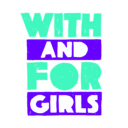A new series from With and For Girls shares learning, resources, knowledge and calls to action regarding the impact of COVID-19 on girls globally. It draws from Collective partners, girl leaders at the grassroots level and the leadership team at Purposeful, where With and For Girls is a programme.
COVID-19 and Girls’ Rights highlights how, in this global health and economic crisis, girls will continue to be the worst affected, and a multitude of issues will be exacerbated, whilst new concerns and inequalities will also arise. We talk to girls in organisations we work with that are responding to unique challenges under COVID-19, and we highlight the vital work done by girl-led and girl-centred organisations that require urgent additional funding at this critical moment. So far, five parts have been published.
Part one: Public health, the economy, and girls’ safety
The first essay highlights how public health, the economy and girls’ safety and bodily autonomy are inextricably linked. Under this health crisis, girls around the world are subjected to increasing pressures to be primary caregivers and to provide financially for their families.
The cruel irony is that despite this intense vulnerability, humanitarian responses during crisis at best ignore girls’ unique needs – and at worst shut them out of recovery efforts. Inequalities in health and in the economy are products of a patriarchal system that devalues and exploits girls. During emergencies, the system doubles down.
Isolation to protect from COVID-19 can be anything but safe if you’re at risk of being trapped in a domestic abuse situation. Two With and For Girls Award-winning organisations share their unique challenges, concerns, responses and needs as frontline domestic violence responders in the climate of coronavirus.
Samoa Victim Support Group (SVSG) provides support for survivors of gender-based violence: it helps survivors process police statements, offers mental-health and legal support, and provides temporary accommodation to girls and women escaping domestic violence. Fundación Para el Desarrollo Comunitario (FUNDECOM), was founded by local community leaders to fight sexual violence against girls and women in rural and coastal areas of Nicaragua. It works to help girls and women heal after violence while empowering them with life skills and information on their rights and gender equality.
Part three: Lessons from the ebola epidemic
In facing how this pandemic will impact girls, this essay looks at a different one: the Ebola epidemic in Sierra Leone. Following the outbreak, Josephine Kamara, Founder of Women of Wonders Sierra Leone and Advocacy and Communications Coordinator at Purposeful, founded a social and development club that facilitates the rehabilitation of girls orphaned by the epidemic and other disasters.
In this essay, one of the eleven With and For Girls Collective strategic partners, and UNESCO warn of the potential for increased drop-out rates which will disproportionately affect adolescent girls, further entrench gender gaps in education and lead to increased risk of sexual exploitation, early pregnancy and early and forced marriage. Over 111 million of these girls are living in the world’s least developed countries where getting an education is already a struggle.
In Mali, Niger and South Sudan – three countries with some of the lowest enrolment and completion rates for girls – closures have already forced over four million girls out of school. For girls living in refugee camps or who are internally displaced, school closures will be most devastating as school often represents the only stable environment to which refugee girls have access. Refugee girls at secondary level are only half as likely to enrol as their male peers. When refugee girls experience a break in their education, they are even less likely to return.
Part five: Sexual and reproductive health and rights
Girls who have access to accurate sex education and safe sexual health services attain higher levels of education, have greater access to economic resources and live longer lives than girls who do not. A girl’s capacity to choose if and when to have children and to prevent or treat sexually transmitted infections is one of the greatest contributors to her ability to decide on her own future.
This piece focuses on the work of two girl-led and girl-centred sexual and reproductive health and rights providers. Roots of Health provides girls in the Philippines with a range of sexual health services including free contraceptives, pre and post-natal care, STI testing, as well as sex education. Asociación AMA is a sex education organisation that operates in primary schools to educate children on sexual and reproductive health and runs a Spanish-Mayan language sex education radio programme called The ABC of Sexuality.
With and For Girls is the world’s only participatory fund by, and for, adolescent girls. It recognises extraordinary girl-led and girl-centred groups and organisations around the world through an annual awards process that offers flexible funding alongside opportunities for collaboration, mentorship, accompaniment and profile raising.





Comments (1)
Good advice, in Africa we need this can of advice.